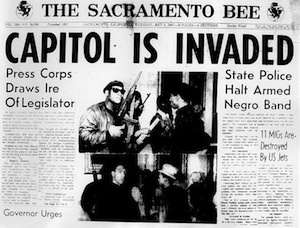Friday A/V Club: What the Gun Debate Looked Like in 1967
Black Panthers, hunters, and "nuts with guns"

In some ways, the gun debates of the 1960s looked a lot like the gun debates of today: The people pushing new rules argued that the arms trade was underregulated, stressed that they didn't want to interfere with hunters, and complained about the National Rifle Association (though the NRA was more amenable to new gun laws in those days than now). In other ways, the debates were rather different: Some of the loudest voices defending the Second Amendment belonged to the Black Panther Party and its supporters on the radical left, and that in turn prompted some conservatives to back certain sorts of gun control.
Both the similarities and the differences are on display in this 1967 footage from the San Francisco TV station KRON, in which a Bay Area official fulminates on all of the above subjects. The immediate context for the interview was the Panthers' armed march on the California State Assembly in Sacramento. Unable to arraign the marchers on any other charges, the authorites charged them with conspiring to forcibly enter the legislature, a legal maneuver that meets the interviewee's approval:
You'll also note his disappointment that when gun-toting Panthers served as bodyguards for Malcolm X's widow, two years after her husband's assassination, they weren't violating any laws. He is additionally upset about an armed (but peaceful) protest the Panthers had organized in North Richmond, California, following the police slaying of a young man named Denzil Dowell. (The gun debate isn't the only place where you can hear echoes of this interview today.)
But the most interesting thing about the man's comments may be the ease with which he moves from denouncing the Black Panther Party to decrying "these people"—presumably on the right—"who are afraid of some kind of bureaucratic takeover of arms." That rapid transition contains whole layers of meaning about the politics of the 1960s.
(For past editions of the Friday A/V Club, go here.)


Show Comments (110)